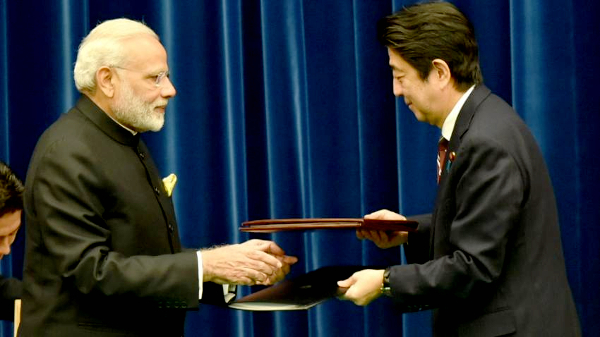Japan and India are moving to share satellite data and surveillance technologies, acknowledging the strategic importance of monitoring outer space and the world’s oceans.
The Japan-India Space Dialogue, established in October by Japanese Prime Minister Shinzo Abe and Indian Prime Minister Narendra Modi, aims in part to keep pace with the U.S., China and Russia in this area.
The first meeting will be held by March 2019 and focus on the sharing of satellite and radar information, as well as ground infrastructure, to beef up each country’s defense capabilities. Japan and India currently have their own systems for monitoring satellite trajectories and ship movements — both important aspects of national security.
India hopes the Japan Aerospace Exploration Agency, or JAXA, can help keep tabs on Chinese troop movements along its northern border. Currently, the country receives information collected by U.S. reconnaissance satellites, but wants to diversify sources.
As for Japan, India’s ocean surveillance capabilities will help it track Chinese naval vessels in the South China and East China seas, as well as detect signs of North Korean missile activity.
Also planned for discussion will be how to track space debris — the millions of pieces of man-made junk orbiting the Earth. The debris poses a danger to satellites that provide GPS location, weather forecasts, telecommunications and other vital services.
The Space Dialogue could also help India further its goal of becoming the fourth country after the U.S., former Soviet Union and China to land on the moon. Japan is already collaborating with India in exploring the lunar polar zone, while India has succeeded in putting a probe into orbit around Mars.
Both countries are operating satellite positioning systems similar to America’s GPS. The dialogue will examine possibilities of collaboration in this area, too.
The Space Dialogue delegation from Japan — which already has similar frameworks with the U.S., European Union and France — will be headed by the Ministry of Foreign Affairs and the Cabinet Office, and include officials from JAXA and other ministries.
The Indian side is expected to be represented by the Ministry of External Affairs, Ministry of Defense and the Indian Space Research Organization.
Source: Asia Nikkie
Image Courtesy:Zee Business
You may also like
-
IAF Aircraft Set Course For Exercise Eastern Bridge VII At Oman
-
India-us Working Together In Areas Like Critical Minerals, Supply Chains And Advanced Technologies: Shri Piyush Goyal
-
IAF Set To Host The Indian Defence Aviation Exposition-II At Jodhpur
-
Defence Secretary to co-chair 5th India-Philippines Joint Defence Cooperation Committee meeting in Manila
-
Simultaneous Launch Of ‘malpe And Mulki’, Fourth And Fifth Ships Of Asw Swc (Csl) Project
